Contrary to these fears, the demand for IT professionals is rising. This phenomenon can be attributed to the increasing complexity of AI systems, which require skilled personnel to develop, maintain, and manage these technologies.

Artificial Intelligence (AI) is significantly increasing job opportunities in IT by revolutionizing how businesses operate. AI automates repetitive tasks, such as data entry and basic troubleshooting, liberating IT professionals to focus on more strategic initiatives. This not only reduces operational costs but also enhances productivity, painting a promising picture of the future of IT work in the AI era.
Moreover, AI's ability to analyze vast amounts of data at incredible speeds transforms data-driven decision-making within IT departments. IT experts skilled in AI can extract valuable insights from complex data sets, enabling organizations to make informed decisions more quickly and accurately.
AI plays a critical role in enhancing defences against cyber threats in cybersecurity. AI-powered systems can detect anomalies in network behaviour, identify potential security breaches, and respond proactively to mitigate risks. This capability is essential in safeguarding sensitive information and maintaining the integrity of IT infrastructures.
Additionally, AI is improving customer experiences through personalized interactions. AI-powered chatbots and virtual assistants can engage with customers in real-time, providing tailored recommendations and solutions. IT professionals specializing in AI-driven customer service technologies are in high demand as businesses strive to deliver exceptional customer satisfaction and loyalty.
Furthermore, AI fosters innovation within IT departments by facilitating the development of advanced technologies and solutions. From predictive analytics to autonomous systems, AI enables IT professionals to create innovative products and services that meet evolving market demands and drive competitive advantage.
Overall, AI's integration into IT operations is creating a wealth of opportunities for professionals who possess AI expertise. Mastering AI skills not only enhances career prospects but also empowers IT professionals to play a pivotal role in shaping the future of technology-driven businesses, inspiring a sense of purpose and motivation in their career journeys.

In the rapidly evolving world of technology, Artificial Intelligence (AI) and Information Technology (IT) have developed a profound and symbiotic relationship, reshaping industries and daily operations.
AI enhances IT systems by automating routine tasks and optimizing processes, significantly improving operational efficiency. Machine learning algorithms enable AI to analyze vast amounts of data swiftly, providing valuable insights that inform more intelligent decision-making within IT operations. This capability streamlines workflows, minimizes downtime, and reduces operational costs.
Moreover, AI plays a crucial role in cybersecurity measures within IT infrastructure. Advanced AI algorithms can detect abnormal patterns in network traffic, preemptively identify potential security breaches, and autonomously respond to security incidents in real time. This proactive approach is essential in safeguarding sensitive data and mitigating risks posed by increasingly sophisticated cyber threats.
The synergy between AI and IT also fosters a culture of innovation and agility within organizations. AI's ability to analyze data trends and predict market shifts enables IT departments to develop agile strategies that respond swiftly to changing business dynamics. Furthermore, AI-driven innovation accelerates the development of new IT solutions, from advanced analytics platforms to autonomous systems, propelling organizations ahead in competitive markets.

Yes, IT support and software engineers are essential for developing, deploying, and maintaining AI systems. Here's how each role contributes to the AI landscape.
A Professional Diploma in IT Support and a Professional Diploma in Software Engineering can both be valuable in the AI world, albeit in different capacities.
Foundation in IT Infrastructure: IT support diplomas typically provide a strong foundation in understanding and troubleshooting computer systems, networks, and hardware. This knowledge is essential for maintaining the infrastructure that supports AI systems.
System Administration: IT support programs often cover aspects of system administration, including configuring servers, managing databases, and ensuring the smooth operation of IT environments. These skills are crucial for setting up and maintaining the infrastructure needed to run AI applications and algorithms.
Troubleshooting and Technical Support: IT support diplomas equip students with skills in diagnosing and resolving technical issues, which is invaluable in AI settings where hardware, software, or network problems can impact AI system performance.
Programming and Software Development: Software engineering diplomas focus on programming languages, software development methodologies, and the principles of designing and building robust software systems. These skills are essential for developing AI algorithms, implementing machine learning models, and creating AI-driven applications.
These roles require technical skills in programming languages (such as Python, Java, or C++) and knowledge of algorithms and data structures. Strong problem-solving abilities, critical thinking, and working collaboratively in multidisciplinary teams are essential for success in AI-related software engineering roles.
In conclusion, both IT support and software engineering play indispensable roles in Artificial Intelligence (AI).
IT support and software engineering form a synergistic partnership in the AI landscape. While IT support ensures the smooth operation and maintenance of AI infrastructure, software engineers innovate and implement AI technologies that drive business insights and enhance operational efficiencies.


 Malaysia
Malaysia